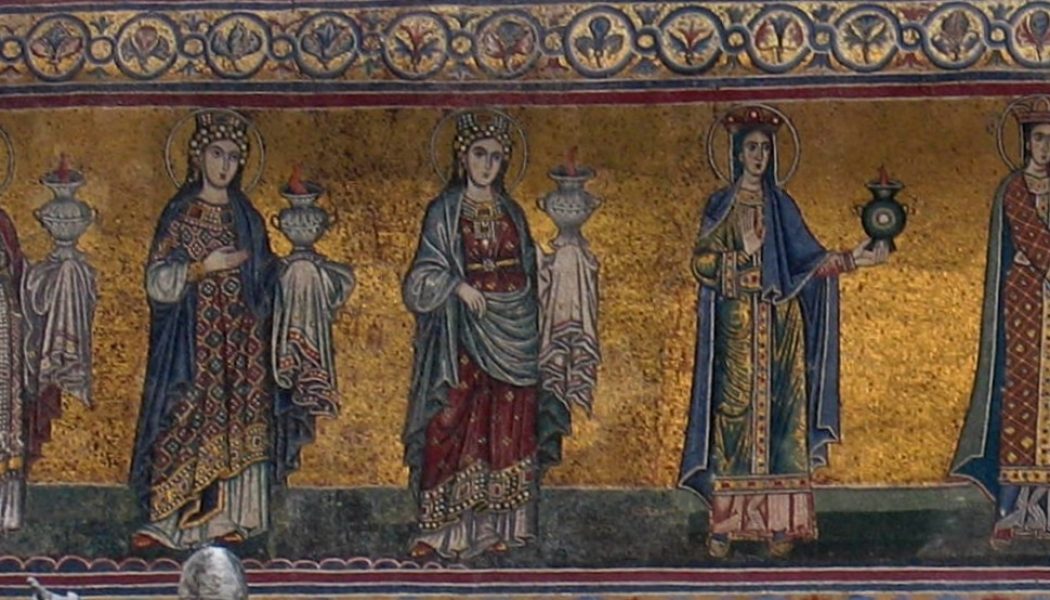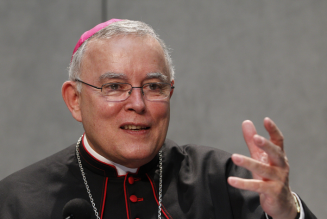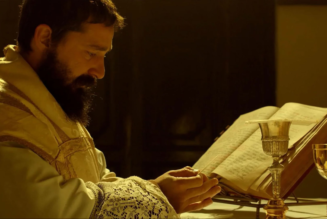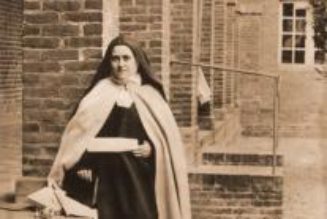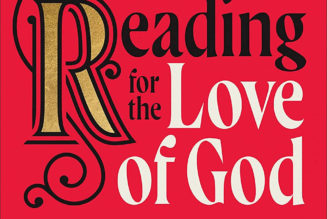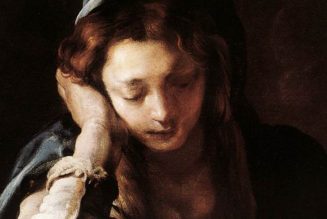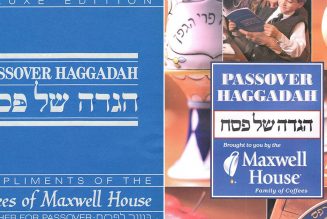
The Gospel this Sunday presents a number of practical principles of preparation. As always the Lord has a way of teaching us in a very memorable way. Let’s look at four principles taught in the Parable of the Wise and Foolish Virgins. In the end we will find that the Lord turns the tables on us.
I. Procure your Provisions – The text says, The kingdom of heaven will be like ten virgins who took their lamps and went out to meet the bridegroom. Five of them were foolish and five were wise. The foolish ones, when taking their lamps, brought no oil with them, but the wise brought flasks of oil with their lamps.
In looking at this text we see that humanity is divided into the wise the foolish. We generally live in times that like to deemphasize distinctions. While there are times when they truly do not matter, today’s Gospel does not depict one of those times. To be wise is to be richly rooted in God and in what He offers: His love, wisdom, grace, mercy, truth, vision, and priorities—His very life.
If one lacks these things is not merely a matter of unfortunate poverty or bad luck, for they are offered richly and freely to all by God.
Lacking these things shows one to be a fool. Many proceed through this life considering themselves very smart, and they may be smart in science, or finance, or business, or sports; but being smart is not the same as being wise. One can be very smart yet still a fool. One may climb the ladder of success, but if it is leaning up against the wrong wall it will lead only to ruin. The wise, whether smart or simple, know God and are recipients of His gifts. The foolish deny Him or His gifts, whether explicitly through conscious resistance or implicitly through lukewarmness and lip service.
In this parable, the wise virgins bring extra oil. They have procured their provisions.
What is this oil? The Fathers of the Church had many answers. Some said it was love, others wisdom or holy deeds. We need not limit it to any one thing, though. The oil is the love of God, the Wisdom of God. It is God Himself. It is all God’s treasures of Scripture, the Sacraments, prayer, the Church, and the liturgy; it is joy, mercy, forgiveness, peace, and the gift of holiness. The wise virgins have stocked up on God’s abundant gifts. They have richly availed themselves of God’s goodness and plentiful graces.
The foolish virgins are not wholly lacking in God’s gifts, for no human being made in the likeness of God is, but they have endowed themselves sufficiently to see the night of this life through. They are careless and lazy. Perhaps carrying extra oil is too much trouble, just as going to Mass, praying, and reading Scripture are too much trouble for “the foolish” today.
What about you? Are you wise or foolish? Put another way, are you procuring your provisions? Are you availing yourself of the oil of God’s good gifts or do you have other “more important” things to do?
The first principle of proper preparation is to procure your provisions.
II. Prepare Personally – The text says, The foolish ones said to the wise, “Give us some of your oil, for our lamps are going out.” But the wise ones replied, “No, for there may not be enough for us and you. Go instead to the merchants and buy some for yourselves.”
At first the answer of the wise virgins surprises us. Shouldn’t they share? Isn’t that what we would expect Jesus to say?
But there are some things you can’t lend and some things you can’t borrow. You can’t borrow someone else’s relationship with God. You can’t borrow holiness, or mercy, or love, or wisdom. You can’t borrow someone else’s prayer life. You have to have your own.
As a priest, I get lots of requests, sometimes for money, sometimes to use the Church for a funeral. I often inquire, “Was the deceased a parishioner here?” So often the answer is, “Well, no, but his grandmother was,” or “his second cousin used to be.” Now I’ll celebrate the funeral Mass, no matter, but the answer is “No, he wasn’t.” The fact that his Grandmother or his second cousin attended Mass here has nothing to do with it. None of that will profit him before God; none of that adds even a drop of oil to his lamp. You can’t borrow your grandmother’s holiness; you have to have your own.
Hence we must personally prepare to meet God. We must come to know Him and to love Him. We must be open to receiving the gifts He offers: prayer, Scripture, the liturgy, the sacraments, the moral life, a new mind and heart.
What about us? Do we have our own oil, or are we just talking about what a great person our grandmother was? An old gospel hymn says, “Yes, I know Jesus for myself.” Do we? Another old gospel hymn says, “My mother taught me how to pray. So if I die and my soul be lost, it’s nobody’s fault but mine.”
The second principle of proper preparation is to prepare personally.
III. Persevere in Preparations – The text says, At midnight, there was a cry, Behold the bridegroom! Come out to meet him! … and those who were ready went into the wedding feast with him. Then the door was locked.
This is an important reminder we must persevere in our walk until the end. The groom did not come until midnight and the foolish virgins could not hold out to the end.
I cannot tell you, how often people tell me things like this: “I used to be an altar boy.” “I used to go to your church.” “I went to St Cyprian’s School” “I’m old St Cyprian’s. Our family goes way back; my Grandfather helped build the place!” I think I’m supposed to be impressed, but instead I ask, “Where are you today?” Usually they aren’t anywhere at all. If so I often respond with something like this: “You’re telling me that you used to have your lamp trimmed and burning, but it sounds like you’ve run out of oil. Watch out, the Day is drawing nigh!”
The point is that only those who were ready with their lamps trimmed and burning when the groom arrived were allowed to entered the wedding with him. After that, the door was barred. We must be faithful unto the end. Jesus says, He who perseveres to the end will be saved (Matt 24:13). Scripture also says, Call no man blessed till he die. For it is by his end that a man is known (Sirach 11:28).
Persevere. It’s wonderful that you read the entire Bible when you were in high school, but where are you today? Where will you be at midnight?
The third principle of proper preparation is to persevere in your preparations.
IV. Procrastination is Perilous – The text says, While [the five foolish virgins] went off to buy [the oil], the bridegroom came … those who were ready went into the wedding feast with him. Then the door was locked. Afterwards the other virgins came and said, “Lord, Lord, open the door for us!” But he said in reply, “Amen, I say to you, I do not know you.” Therefore, stay awake, for you know neither the day nor the hour.
In the end, our wisdom goes with us or our foolishness catches us. The foolish virgins scrambled at the end to get what they needed, but it was too late. The door was barred.
One physical explanation for this detail may be found in the fact that houses of the ancient world were often rather small, but backed out onto a closed courtyard. Hence, when all the guests had arrived, the doors of these small houses were close and the furniture moved up against the walls and the door to make room as the celebration began. To move everything to open the door was problematic, and it was rude to ask for this.
It was just too late for them. Yes, procrastination is perilous.
Two things call for our special attention:
First, there are the words of the Lord, “I do not know you.” The Greek word here is οἶδα (oida) which bespeaks a kind of intellectual knowing. It may surprise us to hear the omniscient Lord say that He does not know them. Perhaps we can understand the word as meaning that He does not “recognize” them as guests; they are not on the guest list. Or, to use another metaphor, they are not among the sheep of His flock. Later in this same chapter of Matthew Jesus will speak of dividing the sheep from the goats. Hence there is a judgment issued here: I do not recognize you as one of my flock; the door cannot be opened; it is too late. But how did it get to be so late and what does it mean that the door is barred?
This leads us to the second point that demands our attention. It is said that the foolish virgins are knocking on the door, or at least calling out, asking for entrance.
But this precisely backward. It is not we who knock, but the Lord. It is He who bids us to open and we who must answer. Jesus says, Here I am! I stand at the door and knock. If anyone hears my voice and opens the door, I will come in and eat with him, and he with me (Rev 3:20). It is the Lord who calls, It was I who chose you (Jn 15:16).
The way to heaven is not through some door “up there.” It is through the door down here, the door that we must open, the door of our heart. The Lord is knocking now. Procrastination is peril; it is foolishness. Now and every day, we must answer the knock. The choice is ours. Yes, the door to Heaven is opened from the inside of our heart. It is we who ultimately determine our destiny. At the judgment, the Lord merely ratifies our decision.
The Lord wants to know us, to recognize us as His own. That is why He knocks and knocks. Will you answer?
Be careful, the fourth principle of proper preparation realizing that procrastination is perilous. There comes a day when the door is forever closed. Remember, the door is your heart. Answer! Open!
[embedded content]
Join Our Telegram Group : Salvation & Prosperity
